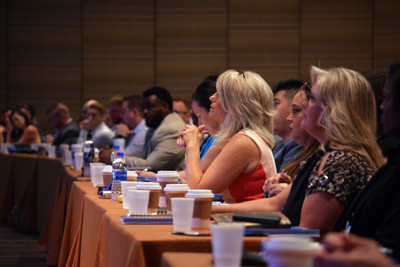The six women speaking during a Women’s Industry Network (WIN) webinar this fall have very different roles within the industry: a sales manager for a paint company, a dealership body shop manager, a senior vice president for a large multi-shop organization, etc.
But what they all had in common was being named WIN 2023 Most Influential Women award honorees, and during the webinar, they talked about how they approach their day-to-day work, how they manager their careers, and how all that interacts with their daily lives.
Jaime Shewbridge, an I-CAR welding instructor, discussed how she handles the stressful aspects of working in the industry. She said that’s something she’s focused on this past year because of the impact she’s seen it have on her physical health. She said you first have to admit to having “a whole lot on your plate,” and “learn how to say no” at times.
"Saying ‘no’ really lowers your stress level,” she said. “You would think it would be the other way around, but it’s not.”
She said she uses “time blocking,” designating certain time for her family, for example, during which “they have 100% of my attention,” and “it doesn’t matter if somebody needs help at work, or if there’s a class, whatever it is, that block is theirs and nothing changes that.”
She also said the book “Extreme Ownership” by Jocko Willink and Leif Babin will “change your perspective on life and help you prioritize your tasks and then execute.”
The biggest change she said she made, however, was giving up multitasking.
“It’s an illusion, right? We all think that we’re good at multitasking. We all think we can do lots of things at one time,” she said. “But I read a study, and I might get the numbers wrong, but if you stop one task, it takes between 17 and 23 minutes to then refocus yourself back on that task. So you lose quite a bit of time by trying to do that. And when I gave up multitasking and just focused on exactly what I was doing at that moment, I became way more productive. I got way more done in a certain timeframe than if I was literally trying to do three things at one time.”
Finding a Mentor
Yohanna Peet, who leads the Technician Apprenticeship Program (TAP) for Caliber Collision, said whatever your role in a collision repair business---from owner to apprentice technician---finding a mentor can help you reach your goals. Look for those, she suggested, who “maybe have gone through a circumstance like you’re going through” or who may also be mentoring someone else.
“Sometimes it’s just asking, and what's the worst they can say, ‘I’m flattered, but I don't really have time right now,’” she said. “Or, the other side of it is, ‘Wow, I had no idea that you saw me from that perspective.’ And what does that do for that person’s self-efficacy, that now [they realize] you see them as a promoter, a mentor. So a lot of what I’m saying is speak up. And when you’re offered a seat at the table, take a seat at the table, take the opportunity to say, ‘That’s great. I want to learn more about this. Can you help me? How did you get there?’ Ask the questions because that’s where you’re really going to see all the reciprocity come with it.”
Being a Mentor
April Lausch also discussed how her experience with mentoring shapes her current role as manager of Faulkner Collison Center of Lancaster in Pennsylvania. Her first job in the industry at age 18 was as an office manager at a collision center.
“The manager at that time was, I would say, my mentor to a point,” she said. “They wanted me to be an estimator. So they sent me to estimating school for two weeks. I got my estimating license. And when I came back to the shop, I still only knew the basics. So the manager kind of took me under his wing. We wrote tow-ins together, and for a couple years, he taught me how to be a really good writer. So as a mentor in that aspect, he was really good.”
She also viewed the shop’s technicians as mentors.
“They helped me more, and still do, even to this day,” she said. “I will be in the shop, and they would just teach me a lot.”
After five years, she said, she got an offer to work at a Chevrolet dealership as an estimator, a job that offered about $60,000 more than she was making. The manager at her existing employer, however, suddenly became very discouraging, “telling me that I couldn’t do it, there was no way that would ever happen, that that job opportunity wasn’t out there,” Lausch said. “After two weeks of that, I almost stayed, but I decided to go, and I ended up becoming assistant manager” at the Chevrolet dealership. She later joined the Faulkner dealership, where she became manager within a year.
“So I had a great mentor until it was time to move on to the next space,” she said, saying that experience has stuck with her. “You know, I'll never hold any of my employees back. I want them to grow. I want them to become better.”










John Yoswick